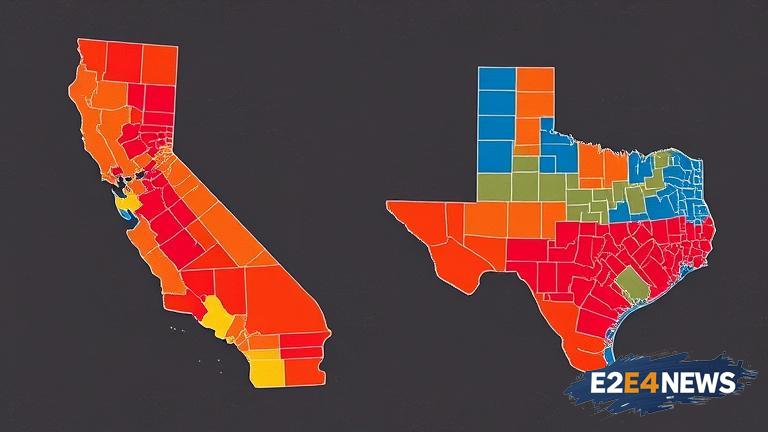The US electoral landscape is poised for a significant shift as California and Texas undergo redistricting, a process that could have far-reaching implications for the balance of power in Congress. In California, the redistricting process may result in the loss of up to 5 GOP US House seats, dealing a blow to Republican representation in the state. This change is largely driven by demographic shifts and the decline of Republican voter registration in the state. On the other hand, Texas is set to gain seats, potentially padding the GOP margin in the House of Representatives. This development is seen as a boon for Republicans, who have been urging Texas to maximize its seat count. The redistricting process in Texas is being driven by the state’s rapid population growth, which has been fueled by an influx of new residents. The addition of new seats in Texas is expected to bolster the state’s already significant influence in national politics. The redistricting process is a complex and contentious issue, with both parties vying for control of the process. In California, the loss of GOP seats is likely to be felt deeply, as the state’s Republican delegation has already been dwindling in recent years. The decline of Republican representation in California is seen as a symptom of the state’s shifting demographics, which have trended increasingly Democratic in recent years. Despite this, Republicans remain optimistic about their chances in the state, pointing to the enduring popularity of conservative ideals among certain segments of the population. In Texas, the gain of new seats is seen as a major victory for Republicans, who have been working to consolidate their power in the state. The redistricting process in Texas has been marked by controversy, with allegations of gerrymandering and voter suppression. However, Republicans have dismissed these claims, arguing that the process has been fair and transparent. The impact of the redistricting process will be felt far beyond the borders of California and Texas, as the balance of power in Congress hangs in the balance. The loss of GOP seats in California and the gain of seats in Texas could have significant implications for the passage of legislation and the shape of national policy. As the redistricting process continues to unfold, both parties will be watching closely, eager to capitalize on any opportunities that may arise. The stakes are high, with control of the House of Representatives hanging precariously in the balance. In the end, the outcome of the redistricting process will depend on a complex interplay of demographic, political, and economic factors. As the dust settles, one thing is clear: the US electoral landscape is poised for a significant shift, one that will have far-reaching implications for the balance of power in Congress. The redistricting process is a reminder that the US electoral system is constantly evolving, with shifts in population and demographics driving changes in the balance of power. As the country looks to the future, one thing is certain: the redistricting process will play a major role in shaping the course of national politics. The addition of new seats in Texas and the loss of seats in California will have significant implications for the representation of these states in Congress. The redistricting process is a complex and multifaceted issue, with many different factors at play. Despite the challenges and controversies surrounding the process, one thing is clear: the redistricting process will have a profound impact on the shape of national politics. The US electoral system is a dynamic and ever-changing entity, with the redistricting process playing a major role in shaping the balance of power in Congress. As the country moves forward, it will be important to closely monitor the redistricting process, as it has significant implications for the representation of different states and communities. The redistricting process is a critical component of the US electoral system, and its outcome will have far-reaching implications for the balance of power in Congress.





